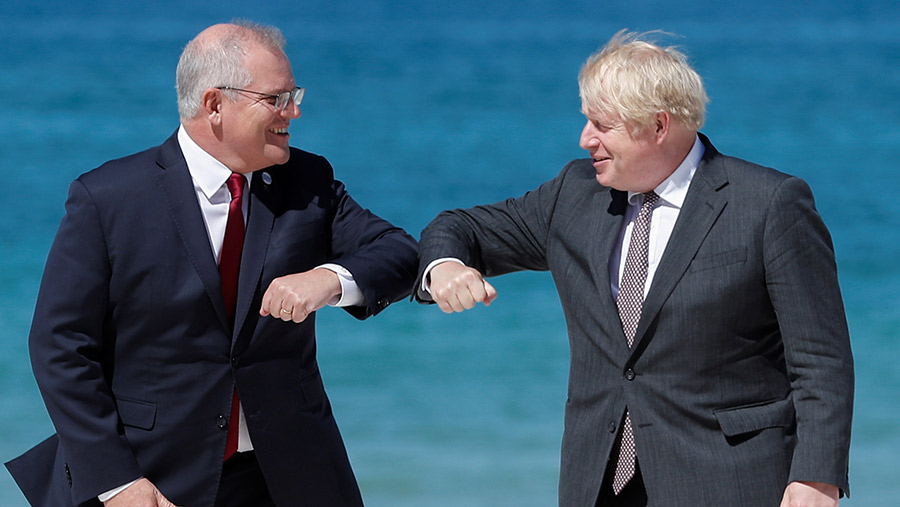UK signs Australia free trade deal despite farmer concerns
 Boris Johnson and Scott Morrison © Reuters/Peter Nicholls/Adobe Stock
Boris Johnson and Scott Morrison © Reuters/Peter Nicholls/Adobe Stock Farm leaders have expressed grave concerns for the future of UK agriculture after Boris Johnson’s government signed a free trade deal with Australia, according to reports.
Prime minister Mr Johnson and Australian PM Scott Morrison agreed the broad terms of a free trade agreement (FTA) over dinner on Monday evening (14 June).
The deal was reportedly agreed by the two leaders at Downing Street when they dined over Scottish salmon, Welsh lamb, washed down with Australian wine.
See also: Opinion: Nothing to fear from a free-trade agreement with Australia
Responding to news of a deal, Glyn Roberts, president of the Farmers’ Union of Wales said: “We have grave concerns that we could end up with a deal that’s catastrophic for animal welfare, the environment, our family farms and our food security – and that it will be set in stone.”
Mr Roberts urged MPs to “do all they can to fully scrutinise and have a say” on the UK-Australia trade deal. Ministers say the Trade and Agriculture Commission will be given time to pore over the detail and report back its findings.
Mr Roberts said MPs must take warnings extremely seriously about the implications of a trade deal that sets the UK on a permanent legally-binding course to open us up to food produced to lower environmental and welfare standards, and undermines our food security and the viability of our family farms.
“MPs must do all they can to prevent a culture of ‘ignore the warnings, get it done and deal with the consequences later’ predominating when it comes to this and other trade deals,” he added.
Lower standards
UK farm leaders have also expressed concerns about lower animal welfare standards on Australian farms.
These include the routine use of antibiotics to counter infections in feedlots and the practice of “mulesing”, whereby sheep have their rear ends sliced without anaesthetic to produce scar tissue as a means of controlling fly infestations.
Farmers in Australia are allowed to use growth-promoting hormones in cattle, and they have access to a number of pesticides that are banned for use in the UK, including looser restrictions on neonicotinoids.
International trade secretary Liz Truss has said that the import of hormone-injected beef will not be allowed to enter the UK market – and this will not change under the terms of any FTA.
The UK government wants tariffs on Australian food imports to be phased out over 15 years to allow British farmers to adjust, but Australia is pushing for a shorter, five-year period.
Cabinet office minister Michael Gove told BBC Radio 4’s Today programme on Tuesday (15 June): “It is the case that the bulk of Australian meat produce will still go to Asia – that’s their principal market.
“It is also the case that our producers – Scottish beef, Welsh lamb – produce food of the very highest quality, so bringing down trade barriers provides us with an opportunity for our brilliant farmers to sell more abroad as well.”
‘No blueprint’ says Gove
But Mr Gove insisted that the UK-Australia deal would not be a blueprint for others to follow, such as the US, Canada and Brazil.
He insisted that Ms Truss is a tough negotiator and will not roll over if other countries want the same deal. He said she will look after the best interests of producers and consumers.
“One of the things about trade deals is that overall they should reduce the costs consumers are facing,” he added.
Mr Gove said UK farmers will still be able to deliver for the environment based on the changing way government is supporting them. And the government will also spend money to help farmers find new markets internationally.
The UK government is expected to announce later on Tuesday that the broad terms of a FTA with Australia have been agreed.
Australian trade minister Dan Tehan confirmed that both countries had reached an agreement.
He said in a statement: “Both prime ministers have held a positive meeting in London overnight and have resolved outstanding issues in relation to the FTA.
“Their agreement is a win for jobs, businesses, free trade and highlights what two liberal democracies can achieve while working together.”
‘In-principle agreement’
Australian agriculture minister David Littleproud told the Australian Broadcasting Corp: “The details are being nutted out from the in-principle agreement that our two prime ministers were able to get to last night over dinner.”
It will be the first trade deal the UK government will have signed with a country following Brexit – and it could set a precedent for similar deals with large agri-producing countries, such as Brazil, the US and Canada.
The cross-party UK Trade and Business Commission issued an urgent call for evidence as news emerged that a deal had been reached.
Farmers Weekly has contacted the Department for Trade and 10 Downing Street to request a comment.
